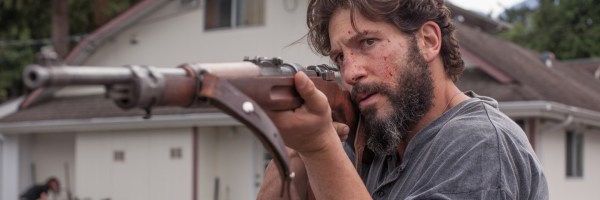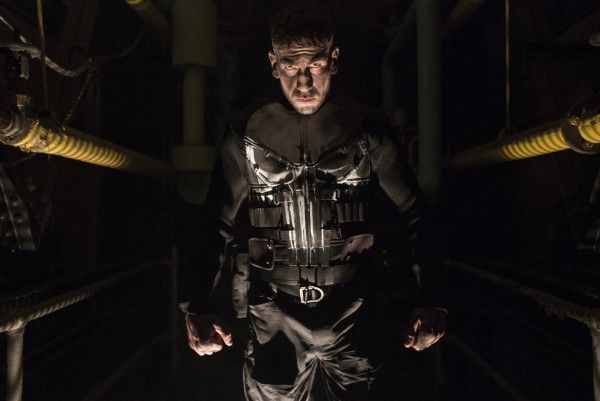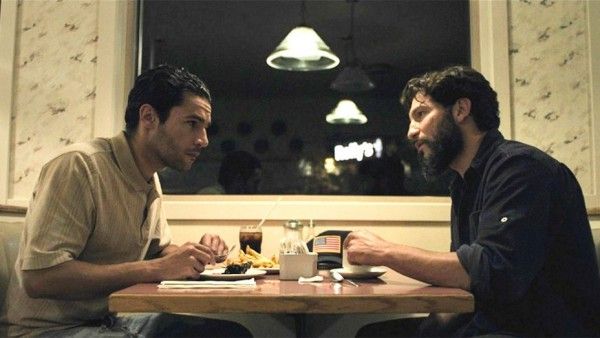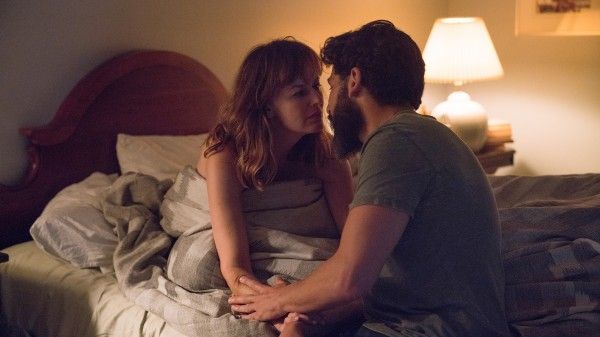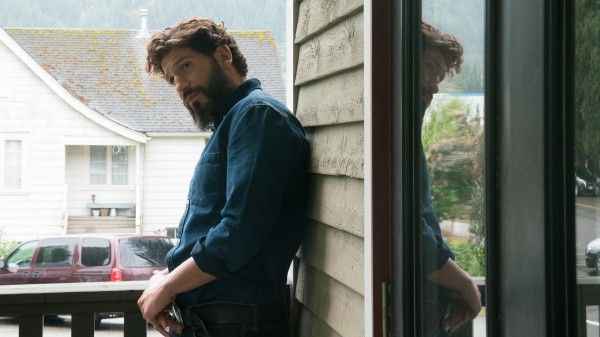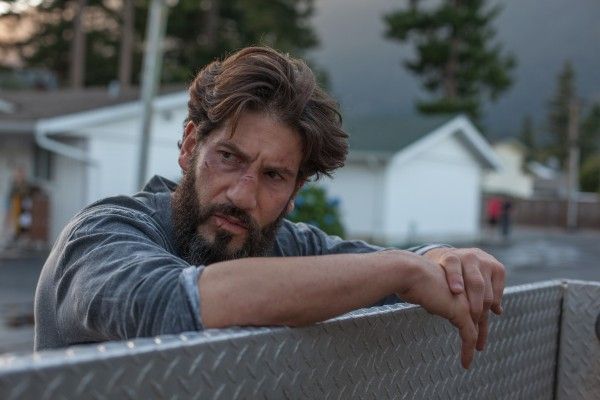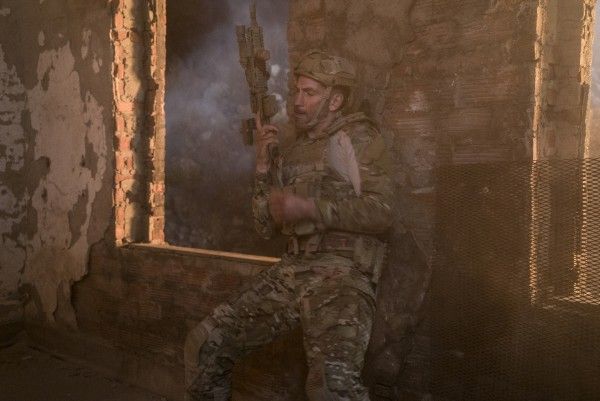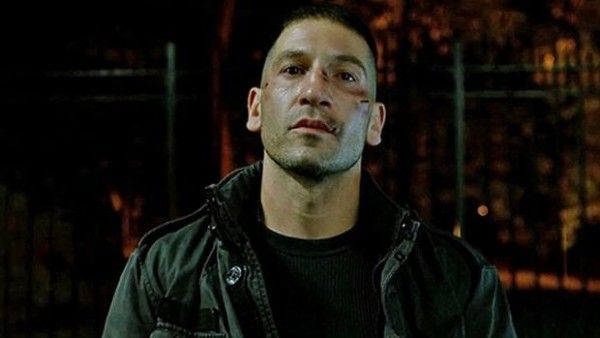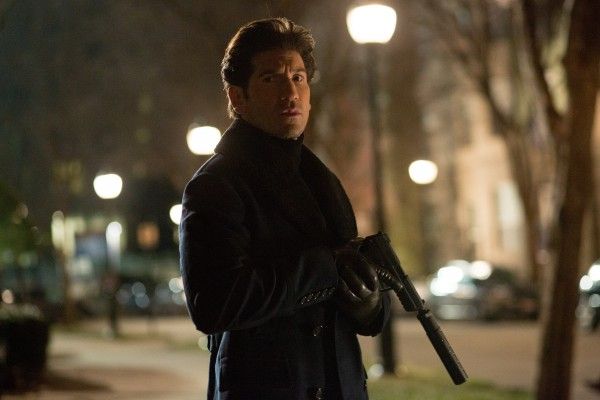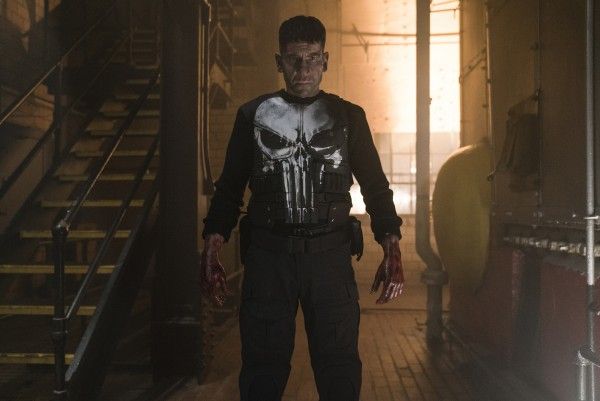With director Jamie M. Dagg’s thriller Sweet Virginia now playing in select theaters and available on VOD platforms, I recently landed an exclusive interview with Jon Bernthal. He talked about how lucky he’s been getting to work with such talented directors, why he’s excited for people to see Sweet Virginia, why he wanted to be involved in the project, how he collaborated with Dagg on his character, if he’s able to leave the character he’s playing on set or does it come home with him, why he likes to drive to the location where he’s filming, and more. In addition, he talked about playing Frank Castle in Netflix’s The Punisher, getting ready to film Damien Chazelle’s First Man, and Steve McQueen’s Widows.
If you’re not familiar with Sweet Virginia, I’d watch the trailer before reading the interview. The official synopsis is also below. The film also stars Christopher Abbott, Imogen Poots, Rosemarie DeWitt, and Odessa Young.
-
A burglary-homicide rattles the residents of a small Alaska town, in particular two women made widows by the crime and their mutual friend, Sam, the proprietor of the local motor lodge. Sam is an outsider himself, a former rodeo champ all too happy to leave the jolt and violence of the ring behind. So when his guests prove unruly or a stranger reaches out to him, reluctance is his natural response. Secrets are revealed, violence increases, and the people in town act more unhinged. His hesitancy — and his willingness to move past it — becomes the lynchpin for his survival.
Check out what Jon Bernthal had to say below.
COLLIDER: Do you feel like the last year or two have just been really, really good for you in terms of the different roles and the different gifted directors you’ve gotten to work with?
JON BERNTHAL: Hey, man, look. I think the whole thing has been really good. I’m kind of blown away. Look, I feel like this has been a really great year for me because I’ve gotten some real time with my wife and kids. I feel like the last few years have been unbelievable, in terms of the people that I’ve gotten to work with and the advantages that I’ve had. I’m enormously grateful for it. I think it was ... It’s a real honor of mine to be able to play Frank Castle. It’s a character that I know means a lot to a lot of people, has real resonance in the law enforcement community, in the military community. That’s something that I take unbelievably seriously and I love the character. He’s in my blood. He’s in my bones and it’s an honor to play him.
I think for a movie like Sweet Virginia, it’s a movie that I’m thrilled to be a part of. I think it’s a throwback to the '70s movies, from my favorite kind of movies. It’s unbelievably elegant filmmaking by Jamie Dagg who’s, I think, one of the most exciting directors working right now and definitely one of my favorites. I think it’s a movie that people are going to go see because of the filmmaking and because of the performance. I think when you see what Chris Abbot does in this film, I think it’s going to blow people’s minds. I think it’s like Javier Bardem in No Country.
I remember when I was young going to the movies to see great performances and to go get my ass horrified by somebody’s performance. I think that’s what you have with what Chris did and I was thrilled that I got a front row seat to it. I’m thrilled that I get to be a part of it.
Chris definitely did a great job on his role and with his work in the film. What I really like about the film is that it’s a slow burn without unnecessary exposition. It’s just a smart script. Talk a little bit about when you read the script -- What was it that first hit you and said, “I need to do this?”
BERNTHAL: Look, man, I think what hit me was why I was wrong for it. I think that’s what hit me more than anything else. I think you’re right. I think it’s a very smart script but it’s enormously, unbelievably intelligent filmmaking. I think much of the script was sort of stripped down and that’s just the kind of filmmaker Jamie is. He’s making the film for an intelligent audience. I believe in the American film audience. I believe that it’s an intelligent audience and I believe that we don’t need to spoon feed information or try to manipulate people’s feelings. I think we should present things and let people sort of heart and minds ... Let them make their own determinations.
When I first read the script, the part was written for a guy in his fifties or sixties and needed to be somebody who was sort of at the end of their life. There needed to be a feeling of someone who was very broken down physically, emotionally and, in a sense, was sort of just hiding, living out the rest of his life. They were originally talking to Forest Whitaker about playing the part and me and Forest don’t really go up for too many of the same roles. Anyway, he ... When he was too busy and decided not to do it they came to me, which is not the most logical next step. To me, I was faced with this sort of enormous problem. I loved the film. I loved the filmmaker. I really wanted to be in it but I didn’t think I was right. I said, “It’s so essential that we get this broken down quality about this character.
I think often times with this kind of work, if you can really pinpoint and locate the crux of the problem, the number one problem or the number one sort of dilemma for a character and what doesn’t work, if you can figure that out, everything else sort of trickles down from there. Jamie was bold enough to really collaborate with me on this and he came up with this idea of having him have early onsets Parkinson’s. I was really built up and strong at the time, so going right into Punisher afterwards, so we needed to play against the way I look and play against the type of character I normally play. Jamie was completely open at every step of the way.
There’s a scene where I get in a fight with the motel guest and it was written that my character beats him up. I offered, “What would happen if I got beat up? What would happen if I’m not the physical person that he once was?,” and Jamie loved it. He ate it up and we really were partners on that. I think it’s been my experience with all great filmmakers, they’re truly collaborators and I believe that of Jamie. We made a special film.
I was just going to bring up the fact that what I really liked was the scene where you do get beat up because it just shows a lot about the character. Also, you’ve played a lot of characters that can kick people’s ass. It’s a nice change where you’re the normal guy in the room.
BERNTHAL: Yeah, and, again, I think that it would’ve been a great moment in the script but you have to understand it’s a huge story point that Sam is brought into an act of violence. It was written that I pull that guy out of his room and I beat the living shit out of him. I think that, when I had this idea of what if I go into the room, I go to handle that guy but I completely get my ass kicked, it’s sort of this thing you really don’t see happen to kind of heroes in films very often. Jamie immediately said, “That’s brilliant. That’s great,” and as soon as I knew he liked it, I knew it was going to work.
Again, that’s rare. I think some people, and it’s really the mark of, in my opinion an amateur artist who’s not open to new ideas, not open to seeing what if we do the absolute opposite of what’s written. It’s really what’s been uniform in every great artist that I’ve had the privilege to work with is that they’re completely open. They’re wide open to other ideas, wide open to doing the opposite. Jamie’s definitely that and also he has the boldness and the courage to tell me, “Hey, man. That’s not a good idea. We’re not doing that.” You know what I mean? That’s when real artistic trust is formed and I really hope to keep working with Jamie. I think he’s a really, really talented filmmaker and he’s got a really exciting career ahead of him.
I’m always curious with actors, how difficult is it for you to distance yourself from a character when you get off set. Can you flip a switch and it’s shut off?
BERNTHAL: When I get off set or when I finish a job?
When you get off set and when you finish a job.
BERNTHAL: When I get off set, it’s interesting, man. I think that you always have to stay in proximity to your character. I think based on what the work ahead of you is, when you finish a night, it’s good to say goodbye to everybody, go home. If my family’s there, I want to be with my family, there’s no question. To me, you have all these people, these wonderful people, these wonderful artists all coming together to collaborate and put all this time and energy and preparation and work into what really comes down to just a matter of seconds between action and cut. At the end of the day, your proximity to how far away from that character you are to the second before they say, “Action,” that’s really your work.
Look, there’s some times where being far away from it is cool. If it’s a scene of you driving down the road and they’re just shooting the car, you don’t need to stay in character. Or you don’t need to stay in an emotional place that serves the project. There’s some scenes that you absolutely do, at least I do, and everybody’s work is different. Everybody’s way they approach their work is different. I respect everybody’s way and I’ll never get in the way of anybody’s work or judge anybody else’s way of working. For me, there ... I never want to be .... I never want to be right before a scene and be searching for something and sort of be like muscling up some emotion. I want to be there. I want to be there ready to go, rearing to go, chomping at the bit, and to be close to it.
I think that that’s a huge part or your job description and, if you go onstage, you got to get ready each night. This is different. It’s you never know when they’re going to say action but ... You got to have time for yourself and it comes with experience and it’s fun. I think one of the best things about this business is it’s impossible to get it right. It’s impossible to arrive. You’re always learning. You’re always figuring out new tools and you’re always trying out new things and you’re always trying to get better. That’s the real great adventure of this job.
As far as when the job is over, that is part of the reason why I drive to work. I don’t fly. When I did Sweet Virginia, I drove from my home in California up to Vancouver, up to British Columbia. Part of sorta going in and going out is getting my dogs and getting them in a truck and packing up. On that drive home, we have time just to sort of decompress and get back to being dad, which is your most important job.
That’s a smart play, the driving thing.
BERNTHAL: Yeah, it’s the only way. As I get busier and busier and I’m jumping around doing more projects at once and with press and all the other, that becomes a lot harder. Now, with my kids and my time is so precious that driving to jobs is becoming harder and more difficult to do. You got to figure out other ways but there’s no question that, if I had it my way, I would literally drive to every job that I worked on, no matter how far. If I could drive overseas, I would do that as well. I think it really is part of my process and it’s important to me.
I definitely have to touch on something else real quick. I’m a huge fan of Damien [Chazelle] and I know you’re working on First Man or maybe you’ve wrapped. I don’t know. What is it like ...
BERNTHAL: I start in a couple days here. We went down to NASA, had some training down there. I met the other actors who were playing astronauts but I have not started shooting.
I couldn’t be more excited for that project. He’s such a talented filmmaker. Was that one of those things where you have a meeting with him and you’re like, “Just tell me what I need to do?”
BERNTHAL: Yeah, we met, and I was kind of blown away with him when we met. You would not think from meeting him, based on the way he ... There’s literally not a drop of arrogance or bravado to this guy. He is so genuine and so thoughtful and so clearly ... You can tell he’s a genius as soon as you start speaking to him. You can tell he cares so much about the work and there’s no sense of him putting off this sort of ... I don’t know, this sort of ... He doesn’t carry himself like this super important, uber-director. He carries himself as a young artist who’s very hungry and this is very important to. He’s done an unbelievable amount of work. It’s just so refreshing. He’s totally the kind of guy that I’d be thrilled to work with and I feel really, really lucky to have the opportunity and I just don’t want to let him down.
Sure, yeah. I’ve spoken to him a few times. The nicest guy.
BERNTHAL: Just unbelievably kind and gracious and smart, seriously, seriously intelligent.
I completely agree. I’m going to jump into a different thing. You’re also part of Steve McQueen’s Widows, which is another project I can’t wait to see because it’s Steve McQueen. Can you talk about working on that project?
BERNTHAL: Yeah. Look, I’m not in it much, man. It’s just one of my favorite things to do ... One of my favorite things to do, man, is just sort of come into a movie for a few days and lay something down and get out. One, it affords me time with my family but, two, it’s part of the magic of movie making. I’ve always loved ... From growing up and watching films, I’ve always loved the kind of movies where you’re watching and you see this character that comes in for a scene or two but you would watch a whole movie about that character. You find yourself wondering, “Where did that person go?,” or, “I wonder what that person’s up to. I wonder what that person’s other relationships are.”
What a character like that does in the film is they really add the authenticity and it really helps create the world and the atmosphere that the other actors are living in. It really creates the fabric of a film and helps with that. I love those opportunities. I get to do it in Wind River and Sicario and Wolf of Wall Street. I love that. I love those kinds of opportunities and that was what I was hoping Widows would be like. It’s a small role. I wasn’t there very much. I’m an enormous fan of McQueen and I hope that the role resonates and I hope the movie’s as good as I think it’s going to be.
Yeah, I’m very confident that that movie will turn out. My last thing I want to jump into is The Punisher. Loved the first six episodes and really enjoyed your relationship with Micro. What was it like making the show as compared to maybe what you thought it would be going in?
BERNTHAL: Look, Ebon [Moss-Bacharch]’s a great actor who plays Micro. My first job in New York was understudying him in an off-Broadway play. I love the opportunity to sort of go toe to toe with him. He’s a celebrated New York theatre actor. He’s a great human being and I guy I’m just really proud that I got to work with him.
Look, I think that as far as The Punisher Season 1, I think that what you saw with Frank Castle in Daredevil Season 2 is you really get to see a guy unhinged. You saw a guy who was reeling from this unbelievable personal trauma that happened and everything, every fiber in his body, is sort of geared towards ... It’s geared towards a mission. It’s all in reaction of what happened. He is absolutely focused. He is looking for the people that took his family and he wants to kill them all. That is the basic storyline of the origin of Frank Castle, and he’s a man on a mission.
I think what, wisely, was the question that they posed in Season 1 of The Punisher and I think this is really ... falls right in line in his uniform with a lot of the vets that I’ve had the honor to speak with, and vets from World War II all the way through Vietnam up until our current wars in Iraq and Afghanistan and so on. A lot of things that guys who have suffered real combat trauma have told me is that, while they’re on missions, when they’re in a firefight, they’re training kicks in and there’s a level of ... They know what to do in those moments. They’re okay in those moments.
It’s the moments after, it’s when they return home, it’s when they try to sleep, it’s once they get away from the fight, that’s when the war inside begins. What do you do when the mission’s over? I think that’s the real question of Season 1 of Punisher. Here’s this guy that we start to see really breaking down and crumbling because he doesn’t have a mission and then a new one is formed. I hope ... Look, I think the season is more psychological. It’s more complex than I think people will expect. I think it’s going to be a slow burn but what I can promise the fans is, by the end of the season, you’re going to see full-on, full brutality, full rage, full emotion and full Frank Castle.
Listen, I know the show’s going to be a big hit and I know fans are going to love your performance in it and the show. Have they already said to you, “Get ready for Season 2. We’re going to film it middle of next year,” or is that still too early?
BERNTHAL: Yeah, it’s too early man. You know Marvel, man. They’re a cagey bunch, man. They don’t tell us much and I feel you will probably know before I do. Look, it’s never been with Frank. It’s never been “will we?” It’s more about “how will we?” and for me it’s ... I care about this character a lot. He’s in my blood. He’s in my bones. It’s a character I’m really honored to play. If they want to write more Frank Castle, it’s just got to be done right. That’s all I care about. We got to do this right for the fans, for the military, for the law enforcement community. We got to do this right because that’s whom this character belongs to. We just got to get it right so that’s what I’m concerned with. I’m concerned with the reaction to this season. I really, really hope people dig it and, as far as Frank’s concerned, if he’s called on, I’ll be ready.

